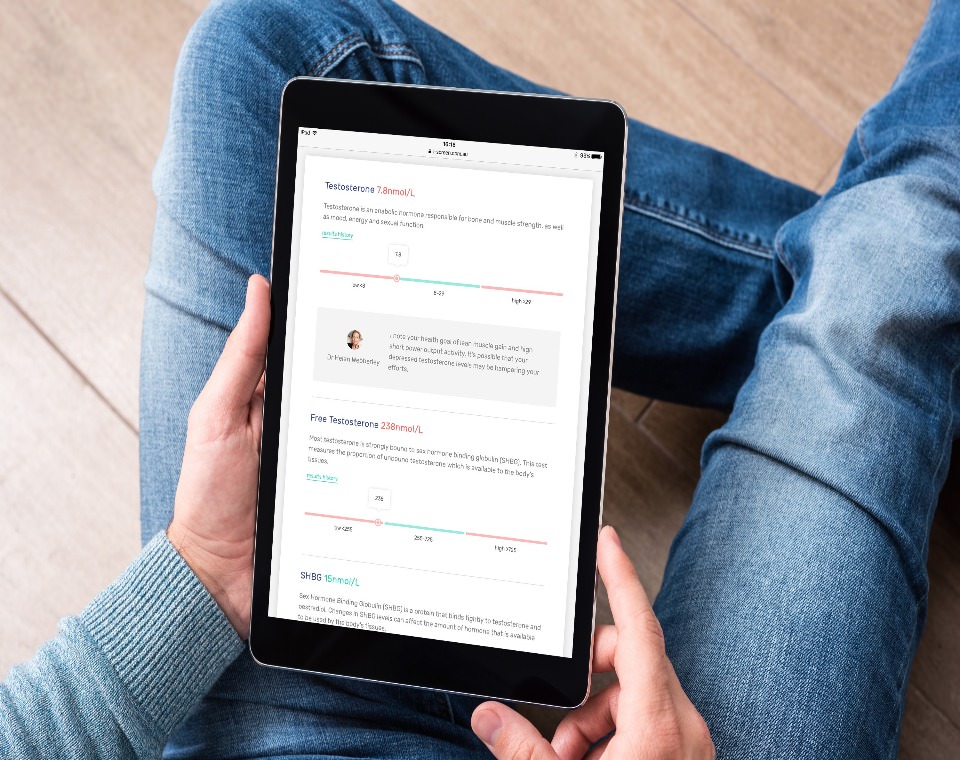Female Hormone Panel
This hormone analysis includes an oestrogen, testosterone and progesterone test, as well as an LH, FSH and prolactin test. These sex hormones (in conjunction with adrenal and thyroid hormones) exert powerful effects on the body. Knowing the function and levels of these hormones is a positive step in creating hormone balance and achieving wellbeing.
This female hormone and progesterone test includes:
Insulin-like growth factor-1 (IGF-1)
IGF-1 is involved in a wide range of physiological processes, including bone growth, muscle growth and repair, and the development of the nervous system. It also helps regulate metabolism, including glucose metabolism and fat metabolism.
This IGF-1 test measures:
Adrenocortex Function (serum)
Cortisol and DHEA-S play important roles in regulating physiological processes in the body. Cortisol has a catabolic effect which mobilises the body’s nutritional resources for fuel. DHEA-S has an opposing anabolic effect and converts food into living tissue. In order to achieve your fitness goals cortisol and DHEA-S must be in proper balance.
Thyroid Function
Your thyroid gland produces hormones that regulate growth and energy expenditure. Thyroid disorders are quite common, and many people don’t have any symptoms at all. This thyroid test screens for the thyroid hormones that play a key role in regulating the body’s metabolism.
This thyroid test measures:
Active Vitamin B12
Vitamin B12 is an essential vitamin found in meat products and certain algae such as seaweed. It helps maintain healthy nerve cells and red blood cells and is also needed to make DNA, the genetic material in all cells. Both high and low vitamin B12 blood test levels may indicate an underlying problem. Low levels can suggest anaemia, a parasite or hyperthyroidism, whilst high levels can be a sign of liver disease, diabetes or kidney failure.
This vitamin B12 blood test measures:
Ferritin (Iron Stores)
This ferritin test is a measure of how much iron you have stored in your body. Low ferritin can be a sign of anaemia caused by iron deficiency. This test can also be used to investigate iron overload syndrome (haemochromatosis) which is an inherited condition where your body cannot remove excess iron.
Bone Health
Calcium and vitamin D play a critical role in maintaining bone health. When you don’t get enough calcium, you increase your risk of developing osteoporosis and stress fractures. This blood test measures your total and corrected calcium levels, your vitamin D levels, and also checks for gout.
Cholesterol
Lipids and cholesterol are fat-like substances in your blood. Some are necessary for good health, but when you have a high level of cholesterol in your blood, a lot of it ends up being deposited in the walls of your arteries and other vital organs. Lifestyle choices including diet, exercise and alcohol intake can all influence cholesterol levels and your risk of developing heart disease.
This cholesterol test measures:
Metabolic
Insulin resistance can lead to difficulty losing weight, distinct abdominal fat, fatigue, bloating and sugar cravings. Identifying insulin resistance early and committing to lifestyle changes can ultimately help the progression to diabetes.
Full blood count with differential
The full blood count is used as a broad screening test to check for such disorders as anaemia (decrease in red blood cells or haemoglobin), infection, and many other diseases. It is actually a group of tests that examine different parts of the blood. Results from the following tests provide the broadest picture of your health.
The full blood count measures:
Liver Function (LFTs)
Your liver processes drugs and alcohol, filters toxic chemicals, stores vitamins and minerals, and makes bile, proteins and enzymes. This liver function test examines enzymes and other markers for evidence of damage to your liver cells or a blockage near your liver which can impair its function.
This liver function test measures:
Kidney Function
Your kidneys filter waste from your body and regulate salts in your blood. They also produce hormones and vitamins that direct cell activities in many organs and help to control blood pressure. When the kidneys aren't working properly, waste products and fluid can build up to dangerous levels creating a life-threatening situation.
This kidney function test measures:
Pancreatic Function
Proteins, fats, and carbohydrates are broken down by stomach acids, enzymes produced by the pancreas, and bile from the liver. This process also releases micronutrients. This blood test measures the levels of enzymes produced by the pancreas.
This blood test measures:
Inflammation
Inadequate recovery from exercise or overtraining can result in inflammation and muscle damage. In addition to c-reactive protein and creatine kinase, this panel also measures homocysteine which is another recognised risk factor for cardiovascular disease, as well as osteoporosis and Alzheimer’s.
This blood test measures:





